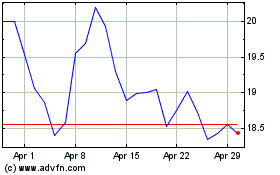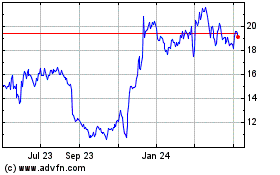By Suzanne Kapner and Joann S. Lublin
Macy's Inc. longtime leader Terry Lundgren will step down as
chief executive at a time when the company he built into the
biggest U.S. department store chain is facing an onslaught of
competition from upstarts and struggling to adapt to changing
consumer demands.
The retailer appointed one of Mr. Lundgren's top lieutenants,
President Jeff Gennette, to take over as CEO in 2017, a move the
company said was part of its succession plan. Mr. Gennette, 55
years old, will join the company's board immediately and gain
additional oversight of store operations.
Mr. Gennette began his career at the retailer in 1983 as an
executive trainee and has climbed the ranks over three decades,
much like his predecessor. Mr. Lundgren, who will turn 65 next
year, will remain chairman.
Macy's directors accelerated the timetable for Mr. Gennette's
ascent to give him the freedom to begin reshaping Macy's now,
according to a person familiar with the company. "He is going to
make the radical changes" before he officially takes the helm, this
person said, adding that Mr. Gennette "has a tough job" ahead of
him.
Shares of Macy's, which rose 1.7% to $33.38 on Thursday, have
lost roughly half of their value in the past 12 months. The decline
attracted activist investor Starboard Value LP, which last year
pressured the company to explore options for its vast real-estate
holdings.
In his 13 years as CEO, Mr. Lundgren repeatedly defied critics
who said the department-store model was dead. In 2005, he
orchestrated the merger of the two biggest chains, Federated
Department Stores Inc. and the May Department Stores Co., creating
a national player that generated $27 billion in revenue last
year.
Macy's was one of the brands owned by Federated and the whole
company was renamed Macy's in 2007 as Mr. Lundgren eliminated
regional brands like Burdines, Filene's and Marshall Field's.
Mr. Lundgren pioneered the idea of tailoring store merchandise
to local tastes, a strategy that competitors have copied. And he
presided over a massive renovation of the flagship New York store,
which enabled it to attract high-end brands like Louis Vuitton to
the Herald Square location.
"He steered Macy's through the most transformative and
disruptive period in recent history," said Arnold Aronson, a former
Saks Fifth Avenue CEO who is now a consultant.
But the forces reshaping retailing may have surpassed even Mr.
Lundgren's ability to outrun them. Macy's, like other traditional
department stores, is fending off fierce competition from online
rivals like Amazon.com Inc., fast-fashion retailers such as H&M
Hennes & Mauritz AB, and even its suppliers such as Coach Inc.
or Michael Kors Holdings Ltd., which have built their own store
networks.
In an interview, Mr. Lundgren said he planned to stick around as
chairman for as long as he can help with the transition. "I told
the board, I'm ready to go when you want me to go," he said. "But
having been CEO for 13 years puts me in a unique position to be
helpful."
Macy's results have been disappointing. In the first quarter, it
reported its worst quarterly sales since the recession, setting off
fresh fears about the health of the U.S. retail sector and raising
concerns as to whether the chain is losing market share.
Executives at the retailer have complained that consumer
spending has shifted from handbags and apparel to experiences and
electronics, areas where it has little exposure. To address the
changes, Mr. Lundgren has pushed into off-price retailing to try to
compete with the likes of TJX Cos.' brands TJ Maxx and Marshalls.
Last year, it also acquired beauty and skin-care chain Bluemercury
Inc., a move to try to reach customers beyond the mall.
Finding a lasting solution to the shifting shopping habits will
now fall on Mr. Gennette, a San Diego native and graduate of
Stanford University, who was anointed heir-apparent in March 2014
after being chief merchandising officer for five years.
Mr. Gennette said Thursday that Macy's plans to simplify its
pricing to better communicate the value it offers shoppers; do a
better job of curating its merchandise to contrast with the often
overwhelming choices found at online retailers; and create a
"friction-free" shopping experience in which customers can more
easily find their color or size, or get the help they need.
"We are used to winning and we will win again," Mr. Gennette
said in an interview.
Mr. Gennette is steeped in Macy's with a 33-year career. He
served as a store manager for FAO Schwarz, held merchandise
positions for its men's and children's businesses, and eventually
took executive responsibility for various regions.
Some Macy's directors initially had been unsure whether the
CEO-to-be could identify the sweeping steps needed to get back on
track, given his long Macy's tenure and similar background to Mr.
Lundgren, the person familiar with the matter said. But the full
board ultimately decided Mr. Gennette "has the courage" to make the
big shifts needed, this person said.
Mr. Gennette has filled holes in his management experience since
being elevated to president. He led analyst meetings, dealt
regularly with Macy's finance chief, attended board meetings, and
learned more about marketing, the person familiar with the
situation said.
The company said earlier this year it would close about 40
stores, cutting thousands of jobs. Macy's employed about 157,900
full-time and part-time workers as of Jan. 30. After deciding
against a spinoff of its properties, it has also hired advisers to
explore strategic options for its flagship stores and real-estate
portfolio.
Mr. Lundgren, who started his career in 1975 at a Bullock's
store in Los Angeles, became interested in fashion as a teenager
growing up in California. He honed his look, which consisted of
Sperry topsiders and Farah slacks. In 1972, he was Bachelor No. 2
on "The Dating Game." He won the date. As CEO, he was known for
wearing impeccable suits and never having a hair out of place. He
even designed the dress his wife wore to their 2005 wedding.
But people who know him say he is more than a merchant prince.
"Terry was one of the top CEOs in recent history," said Mr.
Aronson, the former Saks chief. "He will leave his stamp on the
retail industry for many years to come."
Write to Suzanne Kapner at Suzanne.Kapner@wsj.com and Joann S.
Lublin at joann.lublin@wsj.com
(END) Dow Jones Newswires
June 23, 2016 17:51 ET (21:51 GMT)
Copyright (c) 2016 Dow Jones & Company, Inc.
Macys (NYSE:M)
Historical Stock Chart
From Mar 2024 to Apr 2024

Macys (NYSE:M)
Historical Stock Chart
From Apr 2023 to Apr 2024
